Search result29 results
-
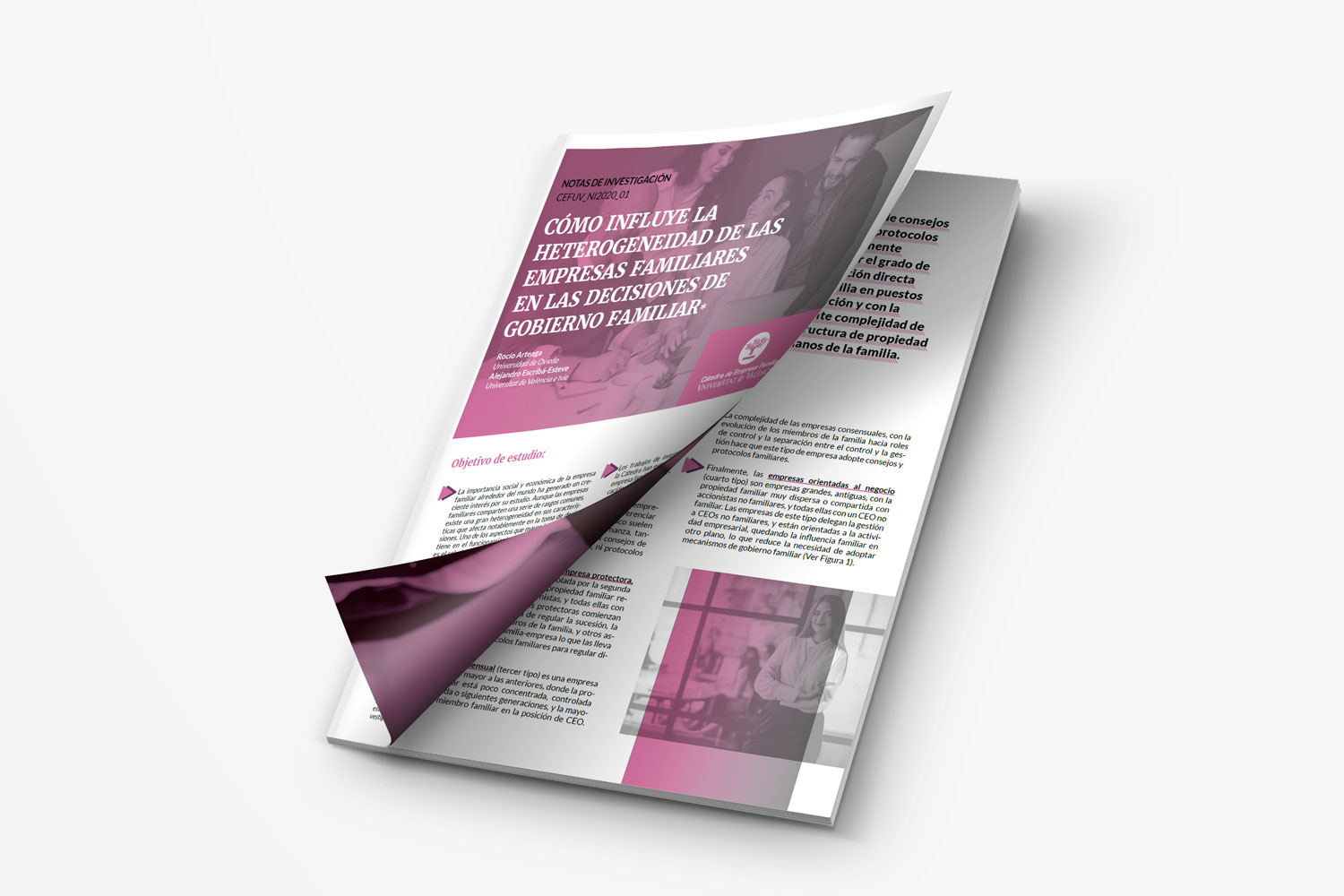
"How Family Business’ Heterogeneity influences family governance decisions".
Rocío Arteaga ((University of Oviedo) Alejandro Escribá (University of Valencia and IVIE).
(2020). Recurs electrònic -
Cuaderno de Trabajo 4/2020. "Claves para la internacionalización de la empresa familiar"
David Carnicer Sospedra (Consortia Consultores)
(2020). Recurs electrònic -
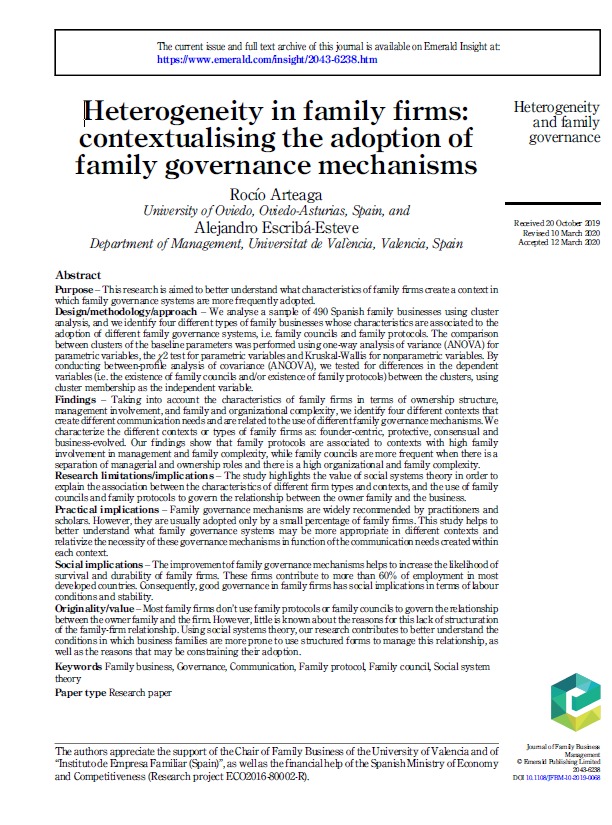
Heterogeneidad en las empresas familiares: Contextualizando la adopción de mecanismos de Gobierno Familiar.
Arteaga, Rocío; Escriba-Esteve, Alejandro
(2020). ArticleThis research is aimed to better understand what characteristics of family firms create a context in which family governance systems are more frequently adopted. Taking into account the characteristics of family firms in terms of ownership structure, management involvement, and family and organizational complexity, we identify four different contexts that create different communication needs and are related to the use of different family governance mechanisms. We characterize the different contexts or types of family firms as: founder-centric, protective, consensual, and business-evolved. Our findings show that family protocols are associated to contexts with high family involvement in...
This research is aimed to better understand what characteristics of family firms create a context in which family governance systems are more frequently adopted. Taking into account the characteristics of family firms in terms of ownership structure, management involvement, and family and organizational complexity, we identify four different contexts that create different communication needs and are related to the use of different family governance mechanisms. We characterize the different contexts or types of family firms as: founder-centric, protective, consensual, and business-evolved. Our findings show that family protocols are associated to contexts with high family involvement in management and family complexity, while family councils are more frequent when there is a separation of managerial and ownership roles and there is a high organizational and family complexity. The study highlights the value of social systems theory in order to explain the association between the characteristics of different firm types and contexts, and the use of family councils and family protocols to govern the relationship between the owner family and the business. Family governance mechanisms are widely recommended by practitioners and scholars. However, they are usually adopted only by a small percentage of family firms. This study helps to better understand what family governance systems may be more appropriate in different contexts and relativize the necessity of these governance mechanisms in function of the communication needs created within each context.
Read more Hide -
Cuaderno de trabajo 3/2019. La continuidad de la Empresa Familiar: Cómo vincular a las próximas generaciones
Alejandro Escribá-Esteve. UV, Director de la Cátedra de Empresa Familiar
(2019). Recurs electrònic -
Nota de investigación 01/2018: El tamaño de la empresa, fuente de competitividad.
Joaquín Juste Méndez y Alejandro Escribà-Esteve.
(2019). Recurs electrònicMediante esta nota de investigación, basada en el informe sobre "caminos para mejorar la competitividad de las empresas valencianas" de la Asociación Valenciana de Empresarios (AVE), pretendemos demostrar la importancia que tiene el tamaño de las empresas para la competitividad y la productividad de esta.
-
Cuaderno de Trabajo 2/2018. "Llegó mi momento." Herramientas y tácticas para un relevo efectivo del liderazgo en la empresa familiar.
Alejandro Escribá-Esteve (UV), Fidel García-Guzmán García (Guzmán Global) y Agustín Gregori Bernabeu (Grefusa).
(2018). Recurs electrònic -
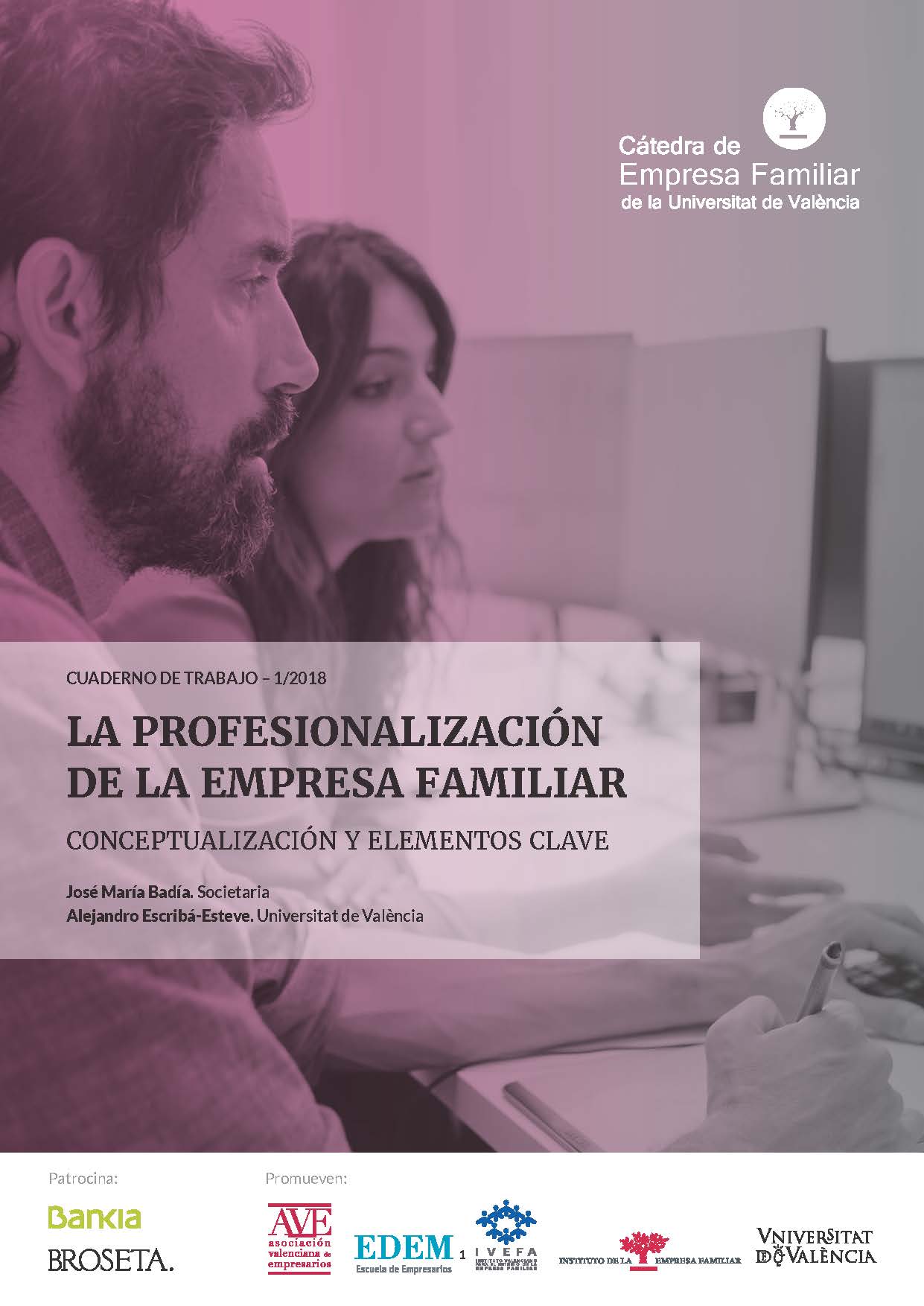
Workbook 1/2018. The professionalization of family firms: conceptualization and key elements.
José María Badía. Societaria and Univeritat de València Alejandro Escribá-Esteve. Universitat de València.
(2018). ArticleWorkbook 1/2018. The professionalization of family firms: conceptualization and key elements..
-
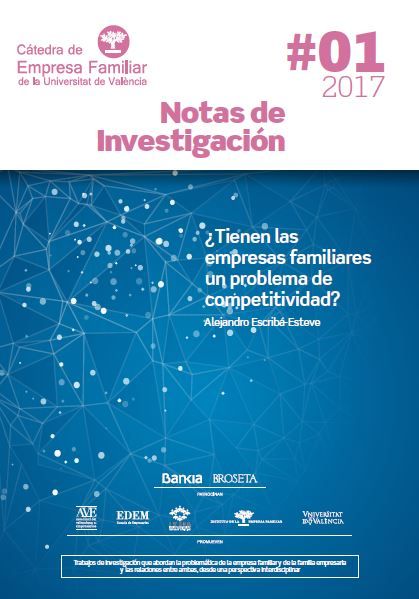
Does the Family Business have a competitiveness problem?
Escribá Esteve, Alejandro
(2017). Recurs electrònicDoes the Family Business have a competitiveness problem?. Cátedra de Empresa Familiar de la Universitat de València. No.1, enero 2017
In the research note # 1 of this new collection, results of a comparative analysis of the competitiveness of family businesses versus non-family businesses are shown. The results of our research show that family businesses suffer, on average, from a lack of competitiveness compared to non-family businesses. This lack is observed above all in the lower presence of family businesses in the groups of companies with the highest competitive level. However, this problem of lower competitiveness does not occur in the case of family businesses that have reached a greater dimension. In fact, the biggest family businesses are more competitive than the non-familiar. This evidence suggests that...
In the research note # 1 of this new collection, results of a comparative analysis of the competitiveness of family businesses versus non-family businesses are shown. The results of our research show that family businesses suffer, on average, from a lack of competitiveness compared to non-family businesses. This lack is observed above all in the lower presence of family businesses in the groups of companies with the highest competitive level. However, this problem of lower competitiveness does not occur in the case of family businesses that have reached a greater dimension. In fact, the biggest family businesses are more competitive than the non-familiar. This evidence suggests that business growth is a facilitating element to avoid or minimize many of the problems that tend to be associated with the family-company relationship, without necessarily losing the positive aspects associated with the family character of the property and the management.
Read more Hide -
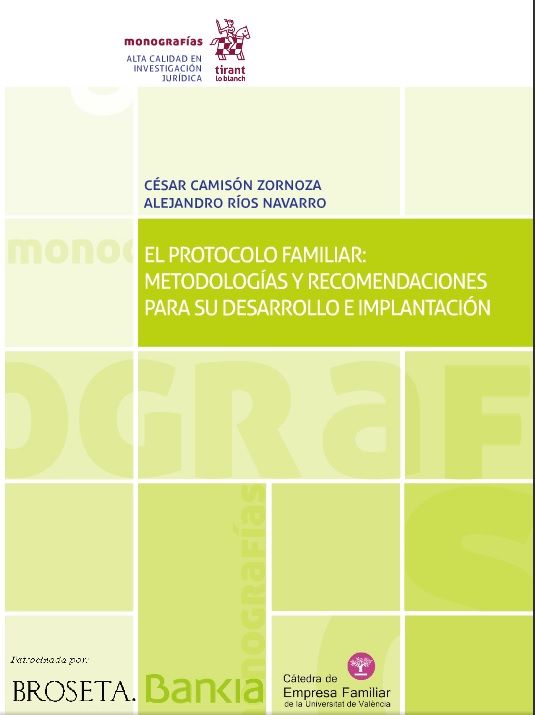
The familiar protocol: Methodologies and Recommendations For its Development and Implantation
Camisón, César; Ríos, Alejandro
(2016). Recurs electrònic -
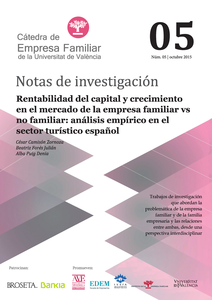
Research note 05/2015: Rentabilitat del capital i creiximent al mercat de la empresa familiar vs no familiar: anàlisi empíric al sector turístic espanyol
Camisón Zornoza, César; Forés Julián, Beatriz; Puig Denia, Alba
(2015). ArticleThis paper analyses tourism firms’ performance, as a measure of their competitive strength through financial results, comparing family business with nonfamily business. This study is justified by the important role of the tourism sector in the Spanish economy and its prospects for global growth, as well as its structural features derived in part by the significant weight of family-owned business. The economic results have been measured on the basis of the return on equity of the company, its sales growth and market share, its production efficiency, and its financial solvency. The objective results indicators come from the company itself or two secondary databases: SABI and INFORMA D & B....
This paper analyses tourism firms’ performance, as a measure of their competitive strength through financial results, comparing family business with nonfamily business. This study is justified by the important role of the tourism sector in the Spanish economy and its prospects for global growth, as well as its structural features derived in part by the significant weight of family-owned business. The economic results have been measured on the basis of the return on equity of the company, its sales growth and market share, its production efficiency, and its financial solvency. The objective results indicators come from the company itself or two secondary databases: SABI and INFORMA D & B. The ex-post analysis is completed with other competitiveness indicators based on self-assessment by the managers in relation to their competition, captured through a primary study with a sample of 1,019 companies.
Read more HideLegal deposit: V-2766-2015
ISBN: 978-84-370-9862-3








